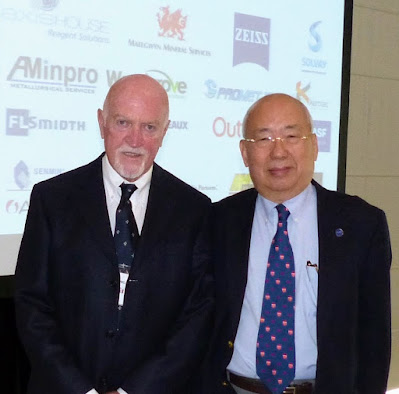Biohydrometallurgy offers various process options including bioleaching, biooxidation, biomineralization, bioprecipitation, biosorption and bioelectrochemistry. The purpose of biohydrometallurgical research is to explore these process options for metal recovery from primary and secondary resources. Bioleaching and biooxidation have been developed over the last decades towards industrial application for processing of sulfide ores, and all these options will be highlighted at Biomining '23 in June. We will be publishing the provisional programme next month, so it is not too late to submit an abstract if you would like to present your work in Falmouth.
 |
| Falmouth from the conference venue, the National Maritime Museum |
Today the biomining share of the global cobalt, copper, nickel, zinc and gold production is between 0.4% and 1.9% for each metal. Future biomining applications may include various complex, low-grade sulfide ores, mine tailings as well as oxide ores such as limonitic laterites. Also secondary resources such as electronic scrap have become a promising target for biohydrometallurgy. The recovery of metals from metal-rich process waters, acid mine drainage and industrial wastewaters has been studied in several projects and has begun to be an industrial reality. There is a high chance that biohydrometallurgy will play a greater role for metal recovery in future.
The increasing importance of biohydrometallurgy in the minerals industry will be highlighted at the Falmouth conference in a keynote lecture from Prof. Axel Schippers, of the Federal Institute for Geosciences and Natural Resources, Germany.
 |
| Axel Schippers with Anne-Gwenaelle Guezennec and Catherine Joulian, of BRGM, France, at Biohydromet '16 in Falmouth |
Axel studied biology at the University of Hamburg, Germany, and received his doctor‘s degree in 1998 for a thesis on the sulfur chemistry of microbial metal sulfide oxidation. Afterwards he worked for two years as a post-doc on sediment microbiology and biogeochemistry in the Max-Planck-Institute for Marine Microbiology in Bremen, Germany. In 2001 he moved to the Federal Institute for Geosciences and Natural Resources in Hannover, Germany and from 2007 he has been head of the Geomicrobiology unit. In 2006 he qualified as lecturer (Privatdozent) for microbiology and geochemistry at the Leibniz University of Hannover and was appointed as Professor in 2011.





















.jpg)






.png)








.jpg)









